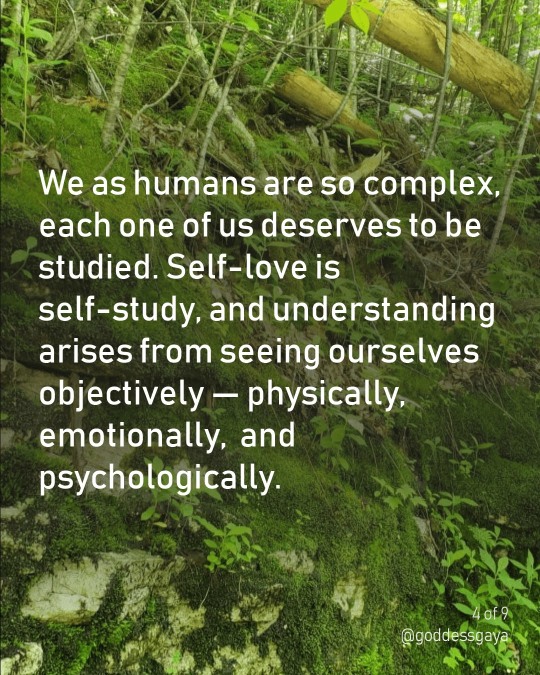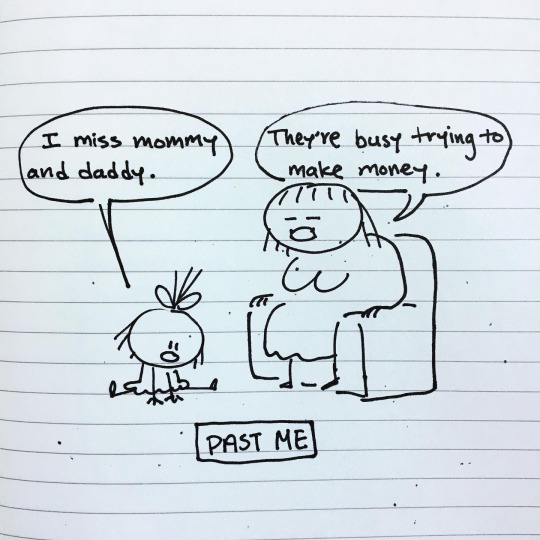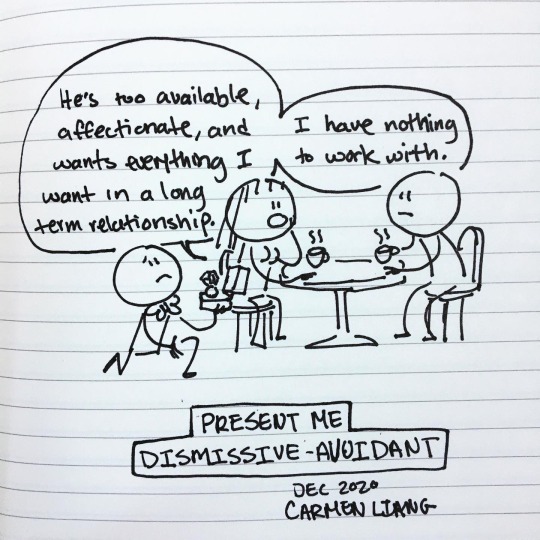Text
I’ve come to one conclusion and it must be that men have been brainwashed for the past 100 years. It is been told that men cannot be vulnerable. When men Xpress vulnerability growing up they’re called pussies due to this phenomenon man no longer express emotion and are more like robots when you don’t learn to express emotion you don’t know how to process it and when you don’t know how to process emotion you clearly can’t cope either
6 notes
·
View notes
Text




Darkness was upon the face of the deep, and the Spirit of God moved upon the face of the waters...
a number of people have mentioned cas' trueform being made in some way of plant life, and i saw this artwork and kinda had... thoughts happen...
4K notes
·
View notes
Text
“If you make your heart into a weapon, you always end up using it on yourself.”
- Gregory David Roberts
1 note
·
View note
Text
i feel like i say this every few months but the way that you're expected to engage in conversation online either by responding to people with increasingly mean spirited snappy one-liners until one of you is "owned" out of the discussion or otherwise simply keep your mouth shut and let people walk all over you and call for your public humiliation until they get bored and move on, because if you show any emotion other than the same casual dismissal and unkindness directed at you then you're a sore loser who's embarrassingly obsessed with everyone who's ever talked shit about you is... fucking weird and stupid lmao
3K notes
·
View notes
Text
We are the main characters of our own game every day. Once we realise this, we can become active participants in the game and actually begin to enjoy it. Unexpected things always happen, but they’re always fun to play. Welcome to the game of life.
178 notes
·
View notes
Text
When you try, you’ll probably have some set-backs. But it will always present the opportunity to learn, grow and expand. Chose to try, chose to expand.
242 notes
·
View notes
Note
Drop some psychology facts on me mom I don't care what it is I crave knowledge
Facts it is, Kassin et al is your social psychology book to go, the theories and tests here are from there.
The most impactful — and also highly ethically questionable — experiments that you need to know are:
Zimbardo’s Stanford Prison Experiment: Male students were assigned warden or inmate roles at random in a faux jail situation. Wardens were told not to harm the prisoners and left alone in the setting. But the subsequent dynamic resulted in the guards turning verbally abusive after two days. The experiment had to be ended because the “prisoners” were breaking down. The conclusion was how much assigned roles in authority positions can change behaviour.
Stanley Milgram Experiment: Experimenters asked participants (males, again) to deliver an electric shock to another participant, an actor in another room who they gave memory questions. One shock for each wrong answer. The participants increased the shock frequency — even until lethal level voltage (!) — when instructed by the experimenters (”You must go on”) even if the actor was displaying great audible amounts of agony. The conclusion being: Humans can follow authority blindly against what is moral. The theory became relevant through the nazi trials.
The Hawthorne Effect: An observer’s presence itself can alter behaviour in an experiment, like making participants want to show their best of abilities.
The Halo Effect: People, relying on a first-hand overal impression, believed that a physically attractive person must be smarter, friendly, and has good judgement.
Pavlov’s Dog: A neutral stimulus can become a conditioned stimulus. Pavlov trained his dog ringing a bell to announce food and it would salivate, now the bell became the stimulus that made the dog salivate even without the food.
Bandura’s Bobo Doll: Children who observe adults treat a large doll aggressively are likely to imitate this model. As in, punching and throwing around the doll. Boys in particular would display a surge in aggression when a male adult would be the model.
The Marshmallow Test: Delayed gratification. One third of a children group would wait alone in a room with a marshmallow to receive a second one if they wouldn’t eat the first. The children who ate the marshmallow right away had lower SAT scores. The conclusion was: Self-control can predict academic success.
The Invisible Gorilla: A video with people passing a basketball that the viewer follows so intently that they miss a person in a gorilla costume walking across the screen repeatedly.
Robbers Cave: Two groups of boys occupied different isolated summer camps and the experimenters made them bond among themselves all while growing more hostile and prejudiced toward the other group through competitions. Only when they were forced to collaborate did they want to ride the same bus home.
And the most important theories being:
Attachment theory: The type of bond you have with caregivers determines the style of relationship. There are four types: Secure, anxious-preoccupied, dismissive-avoidant, fearful-avoidant.
Big 5: Stable character traits that you can measure in scale. Extraversion, Conscientousness, Openess, Agreeableness, Neuroticism.
Cognitive Dissonance: Discomfort through believing two contradictory things or learning facts that contradict a prior personal value.
Terror management theory: Human behaviour aimed at coping with the inevitable prospect of death.
Locus of control: Whether you see yourself subject to outward circumstance or believe that you can change things on your own. (Locus means place in latin.)
Attribution theory: How we explain behaviour either by external aka situational factors or internal aka personal ones.
Triangle of romantic love: High degree of intimacy, passion, commitment. Or: caring, attachment, and intimacy. Also further distinguished by passionate versus compassionate.
Social exchange theory: People focus on positive rewards and negative costs when it comes to relationships. What they think they deserve is based on comparison with other possible relationships and dependency. Commitment is a result of satisfaction x dependency.
The famous 6 Greek Styles of love: Eros, Ludos, Pragma, Agape, Mania, Storge.
Cognitive biases/fallacies: Impact Bias, Hindsight Bias, Memory Bias, Temporal Doppler Effect, Certainty Effect, Free Will Bias, Optimism Bias, Endowment Effect, Actor-Observer Bias, Judgmental bias, Medium Maximization, Focusing Effect, Psychological Myopia, Representativeness Heuristic. List with definitions here.
385 notes
·
View notes
Text










These thoughts are basically an extension of the following quote, which I will always come back to when weighing potential friends and partners:
"Like so much else, people have misunderstood the place of love in life, they have made it into play and pleasure because they thought that play and pleasure was more blissful than work; but there is nothing happier than work, and love, just because it is the extreme happiness, can be nothing else but work." – Rainer Maria Rilke
May you be surrounded by those willing to work for you, may you only allow those in that are. May you look to deeply understand and accept the loves in your life. May
125 notes
·
View notes
Text
Either I was lied too or I was lied too.. I see your face one time I know it forever baby🤥 
The perplexity of the situation is overwhelmingly annoying at this point and I’m just ready to terminate everything
0 notes
Text
“Be soft for the sake of every hard heart; show them with every movement of your body that gentle does not mean weak.”
—
744 notes
·
View notes
Text
“Be soft for the sake of every hard heart; show them with every movement of your body that gentle does not mean weak.”
—
744 notes
·
View notes
Text
“If you care about somebody, you should want them to be happy. Even if you wind up being left out.”
— Stephen Chbosky
805 notes
·
View notes
Text
“No matter how busy you are, if you really care, you will always find the time for someone.”
—
874 notes
·
View notes
Text
“We all think caring too much is bad, so we end up stopping ourselves from caring at all but really we just have to choose what we care for.”
— Subconscious Thoughts
1K notes
·
View notes




